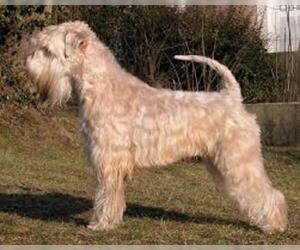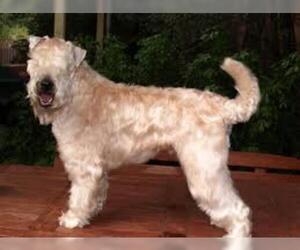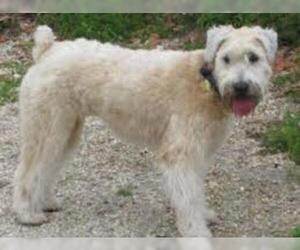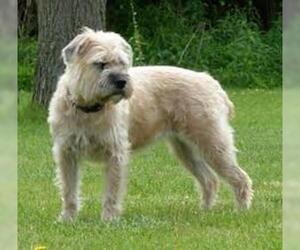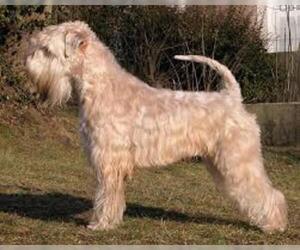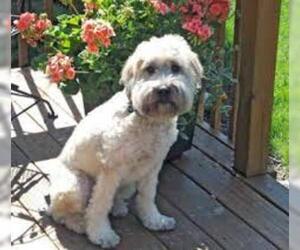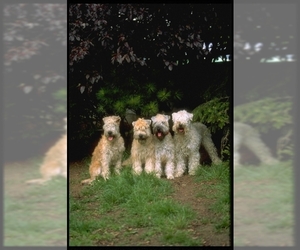
All about Soft Coated Wheaten Terrier dog breed
A.K.A. :Wheaten, Wheatie, SCWT, Irish Wheaten, Soft-coated Wheaten, Irish Soft Coated Wheaten Terrier
Size
Grooming requirements
Exercise requirements
Good with other dogs
Watchdog ability
Energetic
Training requirements
Playful
Affectionate
Good with other pets
Good with children
Good with strangers
Winter
Summer
Healthiness
Protective
Life Span
| Pure Breeds | Member |
| Breeds A - Z | S |
| Breeds by Group | Terrier |
| Breeds by Trait | Good With Kids High Stamina Dog Breeds Hypoallergenic Low Shedding |
| Overview: | The Soft Coated Wheaten Terrier is a medium-sized, playful dog originating from Ireland, where they were all-around farm dogs, helping to herd and guard livestock. Their most striking physical feature is their silky, single coat of wheaten-colored fur, which requires regular grooming to prevent matting and maintain its unique texture. Temperamentally, Wheatens are known for their enthusiastic and affectionate nature, often described as "bouncing" with joy to greet their families, making them excellent companions. They are generally good with children and can adapt well to family life, though their energy levels mean they thrive with active owners and benefit from consistent training and socialization. While their moderate size might suggest apartment suitability, their need for exercise means a house with a yard or dedicated daily walks is preferable. Health-wise, Wheatens can be prone to certain protein-losing conditions like protein-losing enteropathy (PLE) and protein-losing nephropathy (PLN), making regular veterinary check-ups important for this beloved breed. |
F.A.Q.
All You Need to Know About the Soft Coated Wheaten Terrier Breed
The Soft Coated Wheaten Terrier, originating from Ireland, is a beloved medium-sized dog known for its playful and affectionate "wheaten greetin'" nature. These intelligent and energetic terriers boast a single, silky, and *wheaten-colored coat* that requires regular grooming to prevent matting, typically through daily brushing. Wheatens are generally good-natured, making them excellent family dogs, often thriving with children and other pets when properly socialized. While adaptable, their moderate exercise needs mean they benefit from a fenced yard, though consistent walks and playtime can suit apartment living. Potential owners should be aware of common health concerns like protein-losing enteropathy (PLE) and protein-losing nephropathy (PLN). Their *hypoallergenic-like fur* often appeals to allergy sufferers, but no dog is truly hypoallergenic. Choosing a Wheaten Terrier means welcoming a loyal, spirited companion into your home.Soft Coated Wheaten Terrier Weight: Adult Soft Coated Wheaten Terriers typically weigh between 30-40 pounds. Males generally weigh 35-40 pounds, while females usually range from 30-35 pounds. Maintaining a healthy weight for Soft Coated Wheaten Terrier is crucial for their well-being, so consult a vet if you have concerns about your dog's average size.
Here's a friendly and informative answer for your FAQ section:
Soft Coated Wheaten Terrier Height: What's the Average Size?
Thinking about bringing a charming Soft Coated Wheaten Terrier into your home? One common question we get is about their adult height. When you're wondering "how tall is a Soft Coated Wheaten Terrier," it's important to remember that they are a medium-sized breed with a sturdy build.The average height of a Soft Coated Wheaten Terrier is typically measured at the shoulder. For adult Wheatens, you can generally expect them to stand between 17 to 19 inches tall.Here's a breakdown:* Males: Generally fall into the upper end of the range, averaging around 18 to 19 inches at the shoulder.* Females: Tend to be slightly smaller, typically measuring between 17 to 18 inches at the shoulder.It's worth noting that while these are the typical ranges, individual genetics can lead to slight variations. Some Wheatens might be a touch shorter or a little taller than these averages. Rest assured, whether they're on the smaller or larger side of the standard, every Soft Coated Wheaten Terrier brings immense joy and that signature "Wheaten Greetin'!" Understanding their Soft Coated Wheaten Terrier height helps you envision their presence in your home and plan for their space.The Soft Coated Wheaten Terrier colors are quite specific, focusing primarily on shades of wheaten. The AKC recognized Soft Coated Wheaten Terrier colors are all variations of this golden hue. Puppies are often born darker, sometimes with gray or tan points, but their coats lighten and mature to the characteristic wheaten color. The acceptable range includes pale wheaten, golden wheaten, and red wheaten. Any deviation from these wheaten shades, such as brindle, fawn, cream (unless a very pale wheaten), or white (unless an extremely light wheaten), is considered a disqualification by the AKC.There are no officially recognized rare Soft Coated Wheaten Terrier coat types or exotic Soft Coated Wheaten Terrier variations beyond the wheaten spectrum. Therefore, colors like blue, lilac, merle, or chocolate are not found in purebred Soft Coated Wheaten Terriers and would indicate mixed parentage. Potential adopters should be wary of breeders claiming to offer "rare" or "exotic" colored Wheatens, as these are not true to the breed standard and may come from questionable breeding practices. Focus on the beautiful, characteristic wheaten shades when looking for a healthy, well-bred Soft Coated Wheaten Terrier. Pricing for Wheatens is generally not dictated by color, as there is little variation in accepted hues.
The Soft Coated Wheaten Terrier personality is known for being joyful, affectionate, and intelligent. These dogs are generally very friendly and loyal companions, often described as having a "wheaten greetin'" for everyone they meet, including strangers. Their temperament of Soft Coated Wheaten Terrier is sociable, thriving on human interaction and becoming deeply devoted family members. They are adaptable and can live comfortably in apartments or larger homes, provided they receive adequate exercise and mental stimulation. With children, Wheatens are typically playful and patient, making them wonderful family pets, though supervision is always recommended with any dog and young children. Regarding other pets, early socialization is key; while they can get along with other dogs and even cats, their terrier instincts might emerge with smaller, fast-moving animals if not properly introduced. They possess a good-natured yet spirited disposition, making them lively and engaging companions for active individuals or families.
The Soft Coated Wheaten Terrier temperament is generally joyous, spirited, and affectionate, making them wonderful companion dogs. They are known for their “Wheaten Greetin’,” showering new acquaintances with enthusiastic licks and wiggles, reflecting their inherent friendliness and sociability. Wheatens are incredibly loyal to their families, thriving on interaction and becoming deeply devoted companions. While adaptable, they are energetic and require regular exercise, making a house with a yard ideal, though they can adjust to apartment living if their exercise needs are met.
With children, Soft Coated Wheaten Terriers are typically playful and patient, making them excellent family pets, especially if raised with them. Their boisterous nature means they may accidentally knock over very young children, so supervision is always recommended. Regarding other pets, early socialization is key; they can coexist peacefully with cats and other dogs, though their terrier instincts might lead to chasing smaller, unfamiliar animals. They possess a characteristic terrier stubbornness and can be sensitive to harsh correction, responding best to positive reinforcement and consistent, gentle training. This breed’s personality traits include being intelligent, curious, and sometimes prone to mischief, requiring an owner who can provide firm but loving guidance. Their lively and loving disposition makes them a truly delightful and engaging family member.Soft Coated Wheaten Terrier Care: Your Daily Maintenance GuideSoft Coated Wheaten Terrier care involves a commitment to regular grooming, moderate exercise, and proactive health management. These friendly dogs are a joy, but understanding their specific needs is crucial for a happy, healthy life.Grooming Needs: The Wheaten’s beautiful, soft coat is single-layered and sheds minimally, but it requires diligent attention to prevent matting. Expect to brush your Soft Coated Wheaten Terrier at least 3-4 times a week, ideally daily, with a slicker brush and metal comb to remove tangles. Professional grooming every 6-8 weeks for a trim and bath is often recommended. Pay special attention to areas behind the ears, under the legs, and the "feathers" on the tail, as these are prone to matting.Exercise Requirements: Despite their playful nature, Soft Coated Wheaten Terriers are not a "low-energy dog breed" but have moderate exercise needs. Daily walks of 30-60 minutes, playtime in a securely fenced yard, or dog park visits are essential to keep them physically and mentally stimulated. They enjoy activities like fetch and will benefit from training and interactive toys to prevent boredom.Dietary Considerations: Feed a high-quality, age-appropriate dog food formulated for medium-sized breeds. Monitor portion sizes closely to prevent weight management issues, as Wheatens can be prone to gaining excess weight. Consult your veterinarian for specific dietary recommendations.Wrinkle and Ear Cleaning: Unlike some brachycephalic breeds, Soft Coated Wheaten Terriers do not have deep facial wrinkles requiring special cleaning. Their ears, however, should be checked weekly for redness, odor, or discharge, which could indicate an infection. Clean with a vet-approved ear cleaner as needed.Climate Sensitivity (Brachycephalic Anatomy): Important Note: Soft Coated Wheaten Terriers are NOT a brachycephalic breed and do not have the associated climate sensitivities. Their longer snouts allow for efficient breathing. However, like any dog, avoid strenuous exercise during extreme heat to prevent overheating.Common Health Concerns & Health Tips for Soft Coated Wheaten Terrier: Be aware of common health issues. Skin issues such as allergies and protein-losing enteropathy (PLE) or protein-losing nephropathy (PLN) are notable concerns in the breed. Regular vet check-ups are vital for early detection and management. Dental care is crucial; brush your Wheaten’s teeth several times a week using canine-specific toothpaste to prevent plaque buildup and gum disease. Monitor their overall health and report any changes in appetite, energy levels, or stool consistency to your veterinarian promptly. Proactive care is how to care for a Soft Coated Wheaten Terrier effectively.
Soft Coated Wheaten Terrier Activity Level: Moderately ActiveThe Soft Coated Wheaten Terrier activity level is best described as moderately active, making them a good fit for families who enjoy regular engagement without the demands of a high-energy breed. They possess a delightful balance of enthusiasm and contentment.How active are Soft Coated Wheaten Terrier? These joyful dogs typically have bursts of playful energy, often followed by periods of calm relaxation. They love to play, chase, and explore, but are not known for being incessant movers. Daily Soft Coated Wheaten Terrier exercise needs are important for their physical and mental well-being.Plan for at least 30-60 minutes of moderate activity daily. This can include:* Brisk walks: Two shorter walks or one longer walk are usually sufficient.* Playtime: They thrive on interactive play with their family, enjoying games of fetch, tug-of-war, or puzzle toys. Their intelligence means they appreciate mental stimulation as much as physical.* Yard play: A securely fenced yard is a great asset for zoomies and exploring.Important Brachycephalic Consideration: While they have energy, it's crucial to remember that Soft Coated Wheaten Terriers are a brachycephalic breed, meaning they have a shortened snout. This anatomical feature can limit their stamina and make them susceptible to overheating, especially in warm weather or during intense exercise.* Avoid strenuous activity in heat: Always exercise them during cooler parts of the day.* Monitor breathing: Watch for excessive panting or labored breathing and cease activity immediately if observed.* No long-distance running or extreme sports: They are not built for endurance running or activities that require prolonged, intense exertion.Suitability for Households:* Active families: Soft Coated Wheaten Terriers are generally suitable for active families who can provide consistent daily exercise and engagement. They love to be involved in family activities.* Low-energy households: They might be too active for truly low-energy households unless dedicated time is consistently made for their exercise needs. While they do enjoy lounging, neglecting their activity requirements can lead to boredom and potential behavioral issues.In summary, the Soft Coated Wheaten Terrier is a charming and playful companion who enjoys being active with their family, provided their unique brachycephalic needs are respected. They offer a wonderful blend of energy for play and a calm demeanor for cuddling.
Soft Coated Wheaten Terriers are not brachycephalic, so brachycephalic dog care practices are unnecessary. However, their dense coat and active nature contribute to heat sensitivity, especially in warm climates or during vigorous activity. Providing shade, hydration, and regular grooming is essential. Spinal problems such as arthritis or degenerative disc disease may occur with age or poor conditioning, particularly in dogs with limited mobility or excess weight.
Understanding how to keep Soft Coated Wheaten Terrier healthy involves regular veterinary checkups, early screening for renal and endocrine conditions, consistent grooming to manage coat and skin hygiene, weight control, and tailored exercise routines. With attentive care, Wheatens can enjoy a lively, affectionate life of 12–15 years.
Breed Breakdown: What Experts Say About the Soft Coated Wheaten Terrier
I would rate the Soft Coated Wheaten Terrier's "Size" trait a 6 out of 10.While not a tiny toy breed, they are definitely not a large or giant dog either. Wheatens typically stand between 17 to 19 inches tall at the shoulder and weigh 30 to 40 pounds. Their body structure is sturdy and athletic, but still moderate in scale. Compared to most companion dogs, they fall squarely in the medium-sized category. They are larger than a Shih Tzu or a Bichon Frise, but significantly smaller than a Golden Retriever or a German Shepherd. This moderate size makes them quite versatile; they can adapt well to apartment living provided they receive adequate daily exercise, and their size generally makes them manageable for travel. They are also a good fit for households with moderate space constraints where a truly large dog would be overwhelming.
I would rate the Soft Coated Wheaten Terrier's "Grooming Requirements" at a 7 out of 10.While they are often advertised as low-shedding, their soft, single coat is prone to matting and tangling if not brushed regularly and thoroughly. This requires consistent daily to every-other-day brushing to prevent major knots, which can be time-consuming. Additionally, their hair grows continuously and needs professional grooming or careful at-home clipping every 4-6 weeks to maintain a manageable length and prevent them from looking shaggy or unkempt. Their ears, while not overly prone to infections, still require regular checking and cleaning due to hair growth within the canal. Nail trimming is standard for all breeds, but neglecting it can lead to discomfort for the dog. They don't typically have skin folds to worry about, and while they can be susceptible to allergies like any breed, their coat itself doesn't inherently create skin issues, though matted hair can hide them. Overall, compared to other companion dogs, the Wheaten requires frequent and specialized grooming to keep their unique coat healthy and tidy, moving them far from the "easy to care for" category due to the extensive coat maintenance.
I would rate the Exercise Requirements of the Soft Coated Wheaten Terrier at a 7.Wheaten Terriers are a high-energy breed that thrives on regular, structured activity to remain both physically and mentally healthy. While not quite in the "marathon runner" category of some working breeds, they are far from couch potatoes. Their daily needs typically involve at least an hour to an hour and a half of dedicated exercise, often broken into multiple sessions. This isn't just a leisurely stroll; they possess a good amount of stamina and enjoy sustained movement. Their terrier heritage means they have a natural curiosity and an urge to explore, making engaging walks with opportunities to sniff and investigate very appealing. They excel in activities like brisk walks, jogging with their owner, extended playtime with toys, and especially dog sports like agility, obedience, and even flyball, where their athleticism and intelligence can truly shine. Unlike brachycephalic breeds, Wheatens do not have respiratory limitations that hinder their exercise; in fact, their athletic build and healthy respiratory system allow them to enjoy vigorous activity. Without sufficient exercise, Wheatens can become bored, destructive, and even prone to developing behavioral issues. They truly require consistent effort from their owners to meet their physical and mental stimulation needs, and they definitely won't thrive with just minimal activity.
I would rate the Soft Coated Wheaten Terrier's "Watchdog Ability" at a 5 out of 10.While Wheatens are undoubtedly alert and generally aware of their surroundings, their primary instinct is one of friendly curiosity rather than aggressive deterrence. They are definitely not a passive companion in the sense of being unaware, and you can expect them to bark to announce the arrival of a new person or an unusual sound at the door. Their territorial instincts are present but not strong enough to make them formidable guardians. They will certainly let you know someone is there, providing a meaningful early warning, but their response to unfamiliar people is typically a wagging tail and an invitation to play, rather than a stand-offish or protective stance. They are more likely to greet an "intruder" with enthusiasm than to deter them with any real show of aggression. Therefore, while they excel at the "warning" part, their willingness or ability to actively "deter" is quite low.
I would rate the Soft Coated Wheaten Terrier's "Good with Other Dogs" trait as a 7.Wheaten Terriers generally possess a cheerful and friendly disposition, and this often extends to their interactions with other dogs. They tend to be playful and enjoy canine company, thriving in environments where they can engage in appropriate play. Many Wheatens are quite adaptable and can get along well with dogs of various sizes and energy levels, particularly if properly socialized from a young age. Their inherent curiosity and desire for interaction usually lead to positive initial encounters.However, the "Terrier" in their name still holds some weight. While not typically aggressive, they can sometimes exhibit a degree of stubbornness or a desire to be the center of attention. This might manifest as mild bossiness or a tendency to "herd" other dogs, especially if they haven't learned appropriate boundaries. While outright aggression is uncommon, a lack of early and consistent socialization could lead to shyness or cautiousness around unfamiliar dogs. They generally benefit from careful introductions, especially with very high-energy or dominant dogs, to ensure a harmonious relationship. In multi-dog households, they typically coexist peacefully, often forming strong bonds, but their playful exuberance might require some supervision to prevent overwhelming more timid companions. With proper socialization and training, they are generally wonderful companions for other dogs, but their terrier nature means they aren't always a completely passive participant in canine social dynamics.
I would rate the Soft Coated Wheaten Terrier's "Energetic" trait as a 7.Wheaten Terriers are definitely an active and playful breed, much more so than many other companion dogs. They possess a good deal of stamina and enjoy regular, vigorous exercise. Their playful nature means they're always up for a game of fetch or a romp in the yard, and they thrive on physical stimulation. They can happily participate in various outdoor and athletic activities like hiking, agility, or long walks. However, while energetic, they aren't the relentless, non-stop dynamo you might find in some working or herding breeds, which is why they don't quite hit a 9 or 10. They do have an "off switch" and enjoy downtime with their families. Their brachycephalic anatomy, while not as pronounced as in some other breeds like Bulldogs, does mean that extra caution should be taken during hot weather or during very strenuous exercise to prevent overheating and respiratory distress, which slightly limits their absolute peak endurance compared to a truly mesocephalic breed of similar energy levels. So, while naturally active and needing a good amount of exercise, their physiology dictates a mindful approach to their physical limits.
I'd rate the Soft Coated Wheaten Terrier's "Training Requirements" a 6 out of 10.While intelligent and eager to please those they love, Wheatens possess a delightful but sometimes challenging independent streak and a playful exuberance that can translate into "selective hearing." Their attention span can be short-lived, especially in stimulating environments, and they are easily distracted by exciting smells, sights, or potential playmates. Consistency is absolutely paramount; without it, they will quickly learn what they can get away with. They respond very well to positive reinforcement, such as treats, praise, and enthusiastic play, but harsh corrections will cause them to shut down or become wary. They aren't generally stubborn in an aggressive way, but rather in a "what's in it for me?" or "this is more fun than that" kind of way. This breed is not ideal for a first-time dog owner who isn't prepared to dedicate significant time and effort to consistent training and socialization. While a beginner can certainly succeed, they need to be highly committed, patient, and prepared to attend puppy classes and potentially work with a professional trainer to establish clear boundaries and routines from a young age. Their energetic nature and "Wheaten greetin'" jump-up behavior also require early and consistent training to manage.
I'd rate the Soft Coated Wheaten Terrier's "Playful" trait a solid 9 out of 10.Wheatens are renowned for their effervescent personalities. They possess an infectious joie de vivre, consistently exhibiting high energy levels and a profound love for games and interaction. Their attention-seeking behavior is often expressed through playful nudges, enthusiastic tail wags, and a persistent invitation to engage. Wheatens respond to toys and playtime with unbridled delight, often engaging in lively games of fetch, tug-of-war, or even elaborate self-entertaining antics. Their overall enthusiasm in daily life is palpable, making them naturally spirited and highly interactive companions, far from laid-back compared to many other companion dogs. They thrive on being part of the family's activities and are always ready for an adventure or a good romp.
I would rate the Soft Coated Wheaten Terrier's "Affectionate" trait a 9 out of 10.Wheatens are renowned for their incredibly loving and people-oriented nature. They have a strong desire for human companionship and thrive on being part of the family. Physical closeness is a hallmark of the breed; they are enthusiastic cuddlers, enjoy lap-sitting (regardless of their size!), and will readily lean against their owners for contact. Their loyalty is profound, forming deep bonds with their family members. They are also quite sensitive to owner emotions, often offering comfort when they sense distress. This breed is famously known as the "Wheaten Greetin' " for a reason – they joyfully welcome and seek interaction. They will happily follow their family members from room to room, preferring to be in the same space. Wheatens genuinely thrive on affection and attention, making them far from independent compared to most companion dogs; they truly want to be an integral, cherished part of their human pack.
Rating: 8/10The Soft Coated Wheaten Terrier generally rates high on the "Good with Other Pets" scale, earning an 8. This breed is known for its outgoing and friendly nature, which often extends to other animals. They typically get along well with other dogs, especially when properly socialized from a young age. Their prey drive, while present as with most terriers, is often less intense than some of their more hard-wired counterparts, making coexistence with cats a realistic possibility. However, early and positive introductions are crucial, and a Wheaten's playful, sometimes boisterous, energy might be overwhelming for a shy or elderly cat. While they are not typically prone to severe resource guarding, proper training and management are always advisable in multi-pet households to prevent any potential conflicts over food or toys. Their adaptability and desire to be part of the family make them good candidates for multi-pet homes, but their natural exuberance means that consistent training and supervision are essential to ensure peaceful cohabitation rather than relying solely on natural sociability.
I'd rate the Soft Coated Wheaten Terrier's "Good with Children" trait a 9 out of 10.Wheatens are generally delightful companions for families with children. Their joyful, exuberant, and playful nature often aligns perfectly with a child's energy. They possess a good degree of patience and are typically very tolerant of the noise and activity that come with children, showing a remarkable resilience. They are naturally affectionate and enjoy being part of family activities. While their "wheaten greetin'" jump can be a bit much for very small toddlers, they are highly trainable, and with consistent guidance, this can be managed. They thrive on interaction and being included, making them wonderful playmates and loyal protectors who genuinely enjoy the company of their young humans. Like any breed, early socialization and teaching both children and the dog appropriate interactions are key, but the Wheaten's inherent disposition makes this a rewarding endeavor rather than a challenging one.
Rating: 9The Soft Coated Wheaten Terrier generally rates very highly for "Good with Strangers." They are naturally outgoing and friendly, often greeting unfamiliar adults with an enthusiastic "Wheaten Greetin'" which involves jumping up to lick faces. They possess a joyful and welcoming demeanor, showing little to no reservation around new people. While their exuberance might require some training to temper (especially to prevent jumping), their inherent friendliness doesn't typically need to be taught; it's an ingrained part of their personality. They are not known for barking at or guarding against strangers and adapt remarkably well to public places or environments with guests, often seeking out attention and affection from anyone willing to offer it.
I would rate the Soft Coated Wheaten Terrier's "Winter" tolerance at a 6 out of 10. While their dense, soft, and long coat offers a good degree of insulation, they are not a double-coated breed like many northern breeds, and their body fat content isn't exceptionally high. Their medium size allows for efficient heat regulation compared to very small breeds, and their mesocephalic (moderately proportioned) skull means they don't suffer from the respiratory challenges of brachycephalic dogs in cold air. However, they are still a terrier and, as such, are generally active and prefer to be moving. Prolonged inactivity in very cold temperatures could increase their risk of hypothermia. They can safely enjoy outdoor activities in cold climates, but they aren't built for extreme arctic conditions. Compared to many other companion dogs, they might require a bit more attention in very cold weather. While not necessarily needing a full winter coat for a quick potty break in moderate cold, for longer walks or play sessions when temperatures drop significantly below freezing, a sweater or coat would be beneficial to protect their core body temperature. Their paws should also be checked for ice and salt accumulation, and paw balm might be a good idea for longer outings.
I would rate the Soft Coated Wheaten Terrier's "Summer" tolerance as a 5.While not brachycephalic, which is a significant advantage in heat tolerance, Wheatens possess a dense, soft coat that, despite being single-layered, can become a heat trap in high temperatures. They are an active breed with a generally good ability to regulate their body temperature, but this is challenged by their coat and their inherent desire to play and exercise. They are certainly at a moderate risk of heatstroke if overexerted or left without proper shade and hydration during hot weather. Their recommended outdoor activity levels need to be significantly curtailed during peak summer heat, especially in the midday sun. Owners should be prepared for earlier morning or later evening walks and play sessions. They don't typically require constant climate control like a truly brachycephalic breed, but they absolutely benefit from air conditioning or fans indoors on very hot days and should never be left outdoors for extended periods in extreme heat. Compared to many shorter-coated or more cold-tolerant breeds, Wheatens definitely require special care in the summer months to prevent overheating. Their dense coat and energetic nature mean owners must be proactive in managing their activity and environment.
I would rate the Soft Coated Wheaten Terrier's "Healthiness" trait as a 6.While Wheatens are generally a robust and lively breed with a respectable life expectancy of 12-14 years, they are not without their specific health challenges that prevent a higher rating. They are genetically predisposed to certain conditions that require vigilance from owners and breeders. Protein-losing enteropathy (PLE) and protein-losing nephropathy (PLN) are serious, often debilitating conditions that can significantly impact their quality of life and longevity. Other concerns include renal dysplasia, Addison's disease, and some sensitivities to certain medications or environmental factors. Skin allergies and ear infections can also be recurring issues for some individuals.Responsible breeding plays a crucial role in mitigating the prevalence of these genetic conditions through health screenings and careful selection, but it doesn't eliminate the risk entirely. Early diagnosis and proactive veterinary care are important for managing these potential issues. Compared to some brachycephalic breeds that face constant breathing difficulties or giant breeds prone to severe joint problems, Wheatens are generally more resilient. However, they aren't as consistently "low-maintenance" in terms of health as some truly robust, less genetically predisposed breeds. Their specific predispositions mean owners need to be educated and prepared for potential health monitoring and management, placing them in a moderate category regarding overall health robustness.
I'd rate the Soft Coated Wheaten Terrier's "Protective" trait at a 4 out of 10.While Wheatens are undoubtedly loyal and devoted to their families, and they are certainly alert to their surroundings, their protective instincts are generally not in the realm of a serious guard dog. Their alertness often manifests as enthusiastic barking at the approach of strangers or unusual sounds, making them decent watchdogs in the sense that they will definitely alert you to something amiss. However, their inherent friendliness and "wheaten greetin'" nature usually means they'll quickly transition from barking to wanting to make friends with the perceived intruder. They're more likely to lick an stranger into submission than to offer any meaningful physical protection. Their territorial instincts are present but not aggressive, typically expressed through barking rather than physical confrontation. Overall, the Soft Coated Wheaten Terrier is very much a companion dog, excelling in showering its family with affection and playful antics, rather than providing robust household protection.
I would rate the Soft Coated Wheaten Terrier's "Life Span" trait a 6.This places them in the average to slightly above-average category compared to other companion dog breeds. Their typical lifespan ranges from 12 to 14 years, which is respectable for a medium-sized dog. While they are generally a robust breed, they are prone to certain health issues that can impact longevity, such as protein-losing nephropathy (PLN) and inflammatory bowel disease (IBD), as well as some cancers. Responsible breeding efforts have made strides in identifying and reducing the incidence of these genetic predispositions, but they still represent a significant concern within the breed. With diligent care, a balanced diet, regular exercise, and proactive veterinary attention, many Wheatens enjoy a full and healthy life, but the presence of these breed-specific health challenges prevents them from reaching the higher echelons of canine longevity.
Soft Coated Wheaten Terrier Puppies for saleSee all puppies for sale
Soft Coated Wheaten Terrier Dogs for adoptionSee all dogs for adoption
Soft Coated Wheaten Terrier BreedersSee all breeders
Similar Dog Breeds for Soft Coated Wheaten Terrier
Breed Mixes of Soft Coated Wheaten Terrier
Quick Breed Selector 0 - not important, 1 - smallest, 10 - largest
Variants & Mistakes :Soft Coated Wheeten Terrier, Soft Coat Wheaten Terrier, Soft Coated Wheaten Terrer, Soft Coated Wheatn Terrier, Sofft Coated Wheaten Terrier, Soft Coated Wheatan Terrier, Soft Coated Wheaten Terier, Soft Coated Wheaten Tarrier, Soft Coated Whiten Terrier, Soft Coated Wheatton Terrier, Soft Coated Wheatian Terrier, Soft Coated Wheatyn Terrier, Soft Coated Wheatn Tarrier, Soft Coated Wheatn Terier, Soft Coated Wheatn Terrer, Soft Coated Wheaten Terrior, Soft Coated Wheatwn Terrier, Soft Coated Wheatrn Terrier, Soft Coated Wheatdn Terrier, Soft Coated Wheatfn Terrier, Soft Coated Whetn Terrier, Soft Coated Whetan Terrier, Soft Coated Whetian Terrier, Soft Coated Whetton Terrier, Soft Coated Whetn Terrer, Soft Coated Whetn Terier, Soft Coated Wheaten Terria, Soft Coated Wheaten Terrio, Soft Coated Wheaten Terrie, Soft Coated Wheaten Terrii, Soft Coated Wheaten Terriw, Soft Coated Wheaten Terris, Soft Coated Wheaten Terrid, Soft Coated Wheaten Terrif, Soft Coated Wheaten Terriq, Soft Coated Wheaten Terri, Soft Coated Wheaten Terriee, Soft Coated Wheaten Terrierr, Soft Coated Wheaten Terriew, Soft Coated Wheaten Terriey, Soft Coated Wheaten Territe, Soft Coated Wheaten Terriut, Soft Coated Wheaten Terrily
